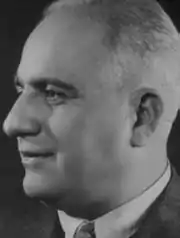Ali Saip Ursavaş | |
|---|---|
 | |
| Born | 1885 Rowanduz, Ottoman Empire |
| Died | 25 September 1939 (aged 53–54) Adana, Turkey |
| Buried | Adana Asrî Mezarlığı |
| Allegiance | |
| Years of service |
|
| Rank |
|
| Commands held |
|
| Battles/wars | |
| Other work | Member of the GNAT (Urfa) |
Ali Saip Ursavaş, also known as Ali Saib Bey (1885, in Rowanduz – September 25, 1939 in Adana) was an Iraqi Turkmen[1] origin, having served in the Ottoman and Turkish armies, and one of the early key members of CHP. He was also a prominent politician of the Republic of Turkey.[2] In 1925 he was nominated prosecutor at the Independence Tribunal in Diyarbakır which was established to counter the Sheikh Said Rebellion and sentenced Sheikh Said to death.[3] Later he succeeded Hacim Muhittin Çarıklı as the Tribunals president.[4]
Works
- Kilikya Faciaları ve Urfa Kurtuluş Mücadeleleri, Ankara, 1940.
Medals and decorations
- Medal of Independence with Red-Green Ribbon
See also
Sources
- ↑ Ezgi, Kılıç (20 May 2021). ALİ SAİP URSAVAŞ’IN BİYOGRAFİSİ VE FAALİYETLERİ (PDF) (in Turkish). University of Harran. p. 10. Retrieved 1 November 2023.
- ↑ Türk Parlamento Tarihi Araştırma Grubu, Türk Parlamento Tarihi, Millî Mücadele ve T.B.M.B. I. Dönem 1919-1923 - III. Cilt: I. Dönem Milletvekillerin Özgeçmişleri, Türkiye Büyük Millet Meclisi Vakfı Yayınları, Ankara, 1995, ISBN 975-7291-06-4, p. 945.
- ↑ Üngör, Umut. "Young Turk social engineering : mass violence and the nation state in eastern Turkey, 1913- 1950" (PDF). University of Amsterdam. pp. 240–243. Retrieved 9 April 2020.
- ↑ Olson, Robert W. (1989). The emergence of Kurdish nationalism and the Sheikh Said Rebellion, 1880-1925. University of Texas Press. p. 124. ISBN 978-0-292-77619-7.
This article is issued from Wikipedia. The text is licensed under Creative Commons - Attribution - Sharealike. Additional terms may apply for the media files.